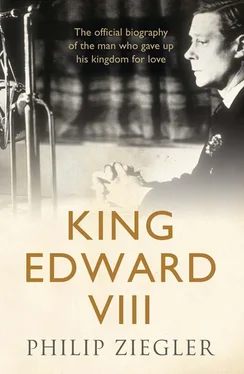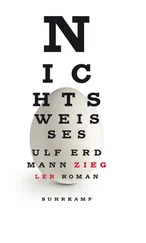Prince Edward, who from birth was always known to his family as David, was followed eighteen months later by a brother, Albert George, who was in due course to become Duke of York and, less predictably, King George VI. Edward attended his sibling’s christening and behaved impeccably until Prince Albert, in the arms of the Bishop of Norwich, began to yell. Edward, evidently seeing this as a challenge to his primacy, yelled louder and was removed. ‘Of course he is very young to come to church,’ the Duke of York told the Queen, ‘but we thought that in years to come it would give him pleasure to know that he had been present at his brother’s christening.’ 14A daughter, Mary, was born in 1897; then came a gap of three years, after which Henry – future Duke of Gloucester – was born in 1900 and George – future Duke of Kent – in 1902. The youngest child, John, born in 1905, was an epileptic who lived in seclusion and was to die at the age of fourteen.
The three elder children were close enough in age to be much together; Princes Edward and Albert – David and Bertie – being in particular inseparable. Lord Esher, visiting Sandringham, played with the children in the garden and noted that: ‘The second boy is the sharpest – but there is something rather taking about Prince Edward.’ 15Most other observers agree it was Edward who was the sharper and who habitually took the lead – ‘because as the eldest son he had the highest status in the family,’ explained the Duchess of York’s close friend, Lady Airlie. 16He found that he could easily manage his tractable and worshipping younger brother, but that Princess Mary was an independent-minded tomboy who was disinclined to do the bidding of any mere boy.
It has often been alleged – not least by the subject of this biography – that the Duke and Duchess of York were cold and distant parents. It would be foolish to pretend that the relationship between the future King George V and his sons, in particular his eldest son, was a happy one. When they were babies, however, all the evidence is that he was a doting father; far more ready to take an interest in his children than was true of most English parents of the upper and upper middle classes. ‘I have got those two photographs of you and darling Baby on my table before me now,’ he wrote to his wife from Cowes in August 1894. ‘… I like looking at my Tootsums little wife and my sweet child, it makes me happy when they are far away.’ 17 *2‘Baby is very flourishing. He walks about all over the house, he has 14 teeth,’ he boasted to Canon Dalton. A month later Prince Edward still walked about all over the house but had sixteen teeth. 18The Duchess was more critical in her attitude. Her baby, she told her brother, was ‘exactly what I looked like as a baby, consequently plain . This is a pity and rather disturbs me.’ 19She does not seem to have had much idea of what was to be expected from a small child: ‘David was “jumpy” yesterday morning,’ she wrote when he was a little over two years old, ‘however he got quieter after being out, what a curious child he is.’ 20When Edward began to get letters from his parents, the Duke of York was always the more demonstratively affectionate. He was coming to Sandringham on Saturday, he told his three-year-old son, and would be ‘so pleased to see our darling little chicks again’. When the chicks had chickenpox; ‘I hope none of you have grown wings and become little chickens and tried to fly away, that would be dreadful and we should have to go up in a balloon to catch you.’ 21
The trouble began when his children reached an age at which mature conduct might reasonably – or unreasonably – be expected of them. Admiral Fisher, at Balmoral in 1903, noted: ‘The two little Princes are splendid little boys and chattered away the whole of their lunch-time, not the faintest shyness.’ 22The comment is notable as marking one of the last occasions on which father and sons were observed together without something being said about the constraint and fear which dominated the atmosphere. Kenneth Rose has convincingly challenged the story by which King George V is supposed to have told Lord Derby: ‘My father was frightened of his mother, I was frightened of my father, and I’m damned well going to see that my children are frightened of me!’ 23But though the tale may well be apocryphal, like most apocryphal tales it contains an essential truth. The Duke of York loved and wanted the best for his children but he was a bad-tempered and often frightening man; he was never cruel, but he was a harsh disciplinarian who believed that a bit of bullying never did a child any harm; he shouted, ranted, struck out both verbally and physically to express his displeasure. A summons to the library almost always heralded a rebuke, and a rebuke induced terror in the recipient. His banter was well-intentioned but it could also be brutal. On the birth of Prince Henry: ‘David of course asked some very funny questions. I told him the baby had flown in at the window during the night, and he at once asked where his wings were and I said they had been cut off.’ 24Prince Edward was six at the time, and he claimed the vision of his brother’s bleeding wings disturbed his sleep for weeks afterwards.
The Duke of York had rigid ideas, invested with almost totemic significance, about punctuality, deportment, above all dress. The children were treated as midshipmen, perpetually on parade. Any deviation from the approved ritual was a fall from grace to be punished for the sake of the offender. ‘I hope your kilts fit well, take care and don’t spoil them at once as they are new,’ wrote the Duke to his eldest son. ‘Wear the Balmoral kilt and grey jacket on week days and green kilt and black jacket on Sundays. Do not wear the red kilt till I come.’ 25Inevitably they got things wrong, wore a grey jacket with a green kilt or a Balmoral kilt on Sundays. Retribution was swift and fearful. ‘The House of Hanover, like ducks, produce bad parents,’ the royal librarian, Owen Morshead, told Harold Nicolson. ‘They trample on their young.’ ‘It was a mystery,’ said a royal private secretary, Alec Hardinge, ‘why George V, who was such a kind man, was such a brute to his children.’ 26
Prince Albert, more nervous and slow-witted than his elder brother, suffered as much, but Edward, both because of his status and his tendency to carelessness, came in for the most censorious attention. His father took due pride in his achievements. David recited a poem ‘quite extraordinarily well’, he noted in his diary. ‘He said Wolseley’s farewell (Shakespeare) without a mistake.’ 27But he felt correspondingly sharp dismay at his son’s backslidings. ‘The real difficulty had been with the Duke of Windsor, never with the present King,’ Queen Mary told Nicolson many years later. 28She deluded herself if she thought that Prince Bertie had escaped unscathed, but she was right in her belief that her elder son, from whom so much was expected and who found acquiescence in his father’s shibboleths so much more uncongenial, was the principal victim in the generation war. Prince Edward certainly saw himself as such, a conviction that was fortified as his childhood slipped farther into the past. He told Freda Dudley Ward’s daughter Angela how lucky she was to have a loving mother. His own childhood had been dreadful, he said; he had received no love and no appreciation for his achievements. 29‘I had a wretched childhood!’ he told his authorial assistant, Charles Murphy. ‘Of course there were short periods of happiness but I remember it chiefly for the miserableness I had to keep to myself.’ 30That this misery was exaggerated in retrospect seems evident, that it was real and painful at the time is hardly less so.
His mother did her best to provide a refuge from the Duke’s harshness. ‘We used to have a most lovely time with her alone – always laughing and joking,’ Edward remembered, ‘… she was a different human being away from him.’ 31But though she made manifest her sympathy for her children, she did little to protect them from their father’s wrath, or to try to change his attitude. Though to later generations she appeared the quintessence of intractable strong-mindedness, she held her husband in awe, as an individual and still more as a future monarch. ‘I always have to remember that their father is also their King,’ 32she was later to pronounce, and the King-to-be deserved almost the same reverence. She saw her role as that of loyal support; to argue with, or still more, criticize her husband was something to be done rarely, and then only with extreme caution.
Читать дальше












